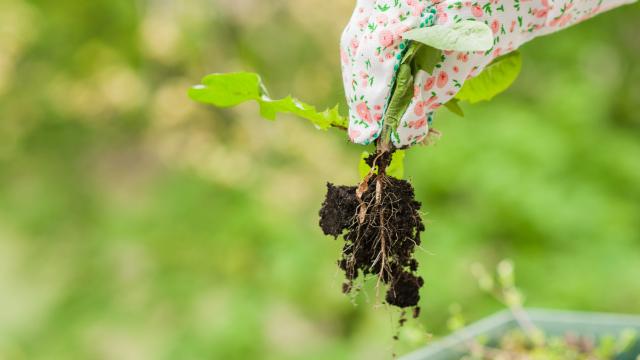After you’ve spent the time, money and energy creating a garden, flowerbed or yard, the last thing you want is for all your hard work to be ruined by weeds. Instead of using commercial weed killer to eliminate those pesky sprouts, there are plenty of more eco-friendly solutions. Here are a few options.
How to get rid of weeds without using chemical
Gardening expert Lee Reich, author of numerous books including “Weedless Gardening” and “The Ever Curious Gardener” recently shared some non-chemical weed-killing methods in an article for the Associated Press. Here are some of his suggestions:
Mulch
In short, mulch can smother weeds. Here are Reich’s instructions for this method:
Pile organic mulches such as leaves, grass clippings, or wood chips a few inches deep over the ground to slow evaporation of water from the soil and keep it cooler. Be careful not to pile mulches right up against young plants or their stems might rot.
He also provides additional information on organic and synthetic mulch options.
Weeding geese
If your yard or garden happens to be mostly grasses, some weeding geese (yes, the birds) might be something to consider. Reich explains:
Young geese will eat their weight in weeds every day. All you need to provide is water, shade, and some supplemental feed, as well as fencing to keep the geese in and predators out.
A couple of geese will patrol up to about an acre, and keep each other company. One caution: Don’t forget that corn is a grass. Plant corn and they’ll eat that too.
Indirect weed control
Taking some time to plan your garden or yard in ways that prevent weed growth is another effective tool in the war on weeds. These strategies include:
- Spacing plants close together shades the ground and prevents weed growth.
- Using drip irrigation — which brings the water supply right to the roots of your cultivated plants — instead of sprinklers.
- Skip the tilling. As Reich puts it, this can help you “avoid potential problems with soil compaction by laying out your garden in permanent beds on which you never step, roll your wheelbarrow or drive machinery. Just lay any compost or fertiliser right on top of the ground.”
This article was originally published in 2012 and updated on August 9, 2020 by Elizabeth Yuko. Updates include the following: Checked links for accuracy, changed headline, updated formatting to reflect current style, changed feature image, and revised/rewrote large portions of the article for accuracy.

Leave a Reply
You must be logged in to post a comment.